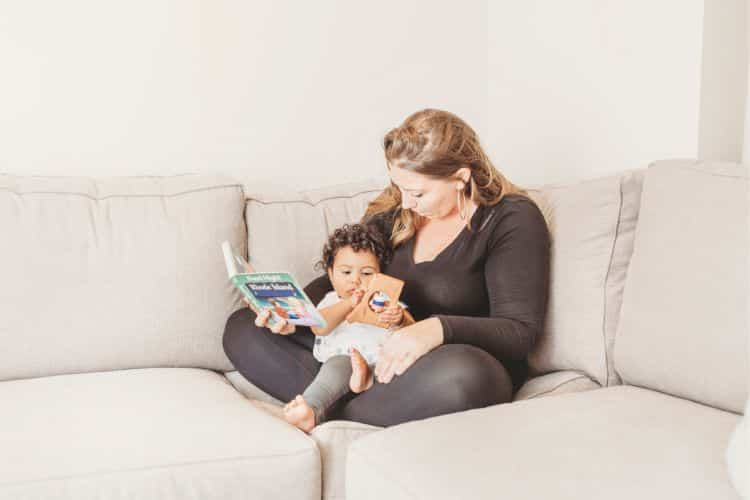How to Talk to Your Baby for Brain Development

Talking to your baby might make you feel a little crazy, it kind of seems like you’re talking to yourself at some point. After all, your freshly born baby can’t possibly be processing anything, right? Well, you might be surprised to find out that talking to your baby from day one can help improve their cognitive abilities. As you speak to your baby, their language skills develop as well. So while it may seem silly to be talking to what is essentially a very cute potato, know that your little one is soaking up every little thing you say to them and learning new things every day.
As their first teachers it’s important to understand not only why we talk to babies, but how to best speak to them. As your baby learns about the world around them from you chatting about what you’re doing, where you are and what you see, it will help them develop their language skills and comprehend things better as they grow.
How to Talk to Your Infant:
- Start right away! Start talking to your babe on day one. Talking to your newborn will help them build a foundation for communication.
- Speak directly to them, not just to others in the room.
- Narrate your actions, from making coffee to driving, narrating your actions will help them associate words with the world around them.
- Use a calm, soothing voice, especially when they’re newborns.
- As they grow, using a higher pitched voice when speaking to them can help hold their attention.
- While speaking, change your facial expressions to enhance communication.
- Let your baby make a noise and then repeat that noise, wait up to ten seconds for them to process that noise and let them react, then rinse and repeat. This allows them to understand the back and forth of communication.
- Respond with enthusiasm to their coos and noises.
- Touch and name objects while doing activities with your baby. This includes colors!
Reading to Your Baby:
Reading to your baby is another great way to utilize speaking and verbalization to teach them while holding their attention. Books also help develop your child’s vocabulary and imagination. Pointing to pictures in the books and naming the characters or items on the page while reading is a great way to teach them as well.
Keeping a variety of age appropriate books on hand and switching them out while also rereading them so they can learn about objects each day is incredibly important for development.
Five Favorite Books to Read From a Postpartum Doula:
- The Very Hungry Caterpillar’s Favorite Words by Grosset & Dunlap
- Dr. Seuss’s 100 First Words by Dr. Seuss
- Oh Baby, The Places You’ll Go by Dr. Seuss
- Brown Bear, Brown Bear, What Do You See? by Bill Martin Jr.(Author), Eric Carle (Author)
- Read to Your Baby Every Day: 30 classic nursery rhymes to read aloud (Stitched Storytime, 1) by Rachel Williams (Editor), Chloe Giordano (Artist)

Singing to Your Baby:
Just like with reading, singing songs to your baby is another way to use vocalization to help them learn in fun and new ways.
Does this mean you have to drive yourself crazy listening to Baby Shark 50 times a day? Nope! Though children’s nursery rhythms are a great way to develop their language skills, any music can help them, especially if you belt them out with enthusiasm. (though let’s be real, Baby Shark is catchy!)
Six Songs to Sing to Your Baby for Brain Development:
- Twinkle Twinkle Little Star
- The Wheels On The Bus
- Five Little Ducks
- The ABC Song
- Old MacDonald Had a Farm
- Its Bitsy Spider
Talking to your baby is something you should work on every day. It might seem like a no-brainer, but we can often confuse passive speaking with direct and intentional speaking. Though it’s also great for your baby to hear adults speaking around and about them, having intentional time daily that you speak to your little one will benefit both of you.
Talking to your baby isn’t just to teach them, it’s a way to bond with them and create a world of trust. How we speak to our children shapes who they become, so speaking to them from day one with all the love, humor and intention you can give them will help make them into the incredible humans you know they can be. Be patient with them and with yourselves and remember, there’s always Baby Shark when times get tough.

Helpful tips from your team at Well Supported Family.
Expert postpartum and newborn advice you can trust.
Since 2016, Well Supported Family has walked alongside thousands of new parents as they adjust to life with a newborn. Our certified Postpartum Doulas and Newborn Care Specialists offer daytime, overnight, and 24/7 in-home care across the United States, bringing steady, knowledgeable support right to your door. If you’re recovering from birth, navigating feeding, or simply overwhelmed by the lack of sleep, we’re here to make those early days feel a little lighter.
Want to explore in-home care for your new family? Reach out today.
